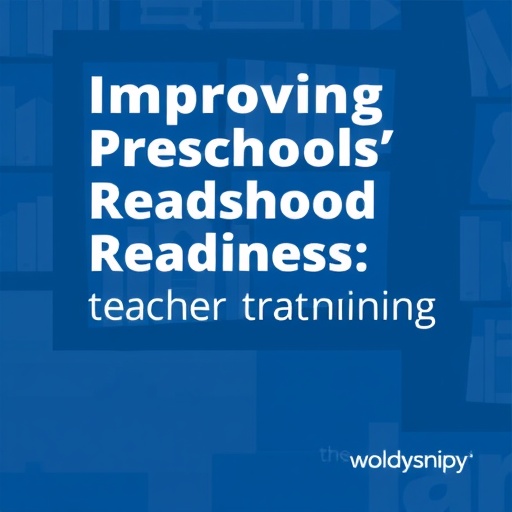In recent years, education researchers have been increasingly focused on the critical transition from preschool to primary school, particularly in how this shift affects young children’s social-emotional development and their readiness for academic challenges. The study conducted by Dinler and Cevher-Kalburan examines a professional development program aimed at educators to support preschoolers during this pivotal transition. The importance of seamless progression from preschool to school cannot be understated, as these early experiences shape children’s long-term academic and social outcomes.
The research highlights that a well-structured teacher professional development program can empower educators to implement strategies that foster not only academic skills but also the social-emotional competencies needed for success in school settings. By focusing on nurturing these dimensions, the program aspires to create a supportive environment where children can thrive both socially and emotionally. The authors emphasize that understanding the nuances of children’s experiences during this transition is critical for formulating effective educational approaches, and training teachers is at the heart of this endeavor.
The study’s design involved a robust methodology that incorporated qualitative and quantitative approaches to evaluation. Teachers participating in the program received specialized training that included workshops focused on social-emotional learning (SEL) practices, classroom management techniques, and methods for fostering inclusion. The program’s design is rooted in the understanding that educators play a pivotal role in shaping young children’s perceptions of their school environment and their readiness for new social contexts.
A key finding from the research was that teachers who engaged in the professional development program reported increased confidence in their ability to help children navigate their emotions and social interactions. This boost in confidence allowed educators to implement SEL strategies more effectively in their classrooms. The implications of this finding are profound, as a confident teacher can significantly enhance children’s engagement and responsiveness during their transition to primary school.
Moreover, the study provides empirical evidence supporting the idea that children who participated in classrooms with educators trained in these effective practices displayed improved social-emotional adjustment. These children were more likely to engage positively with their peers, seek assistance when needed, and exhibit resilience in the face of new challenges. The authors argue that fostering these skills in preschool can lay a strong foundation for children’s later academic success and overall well-being.
Furthermore, the research discusses how social-emotional adjustment is intricately linked to school readiness. The ability for children to demonstrate self-regulation, form friendships, and navigate group dynamics directly influences how well they adapt to the structured environment of a primary school. As educators equipped with proper training create welcoming frameworks, children are better positioned to tackle academic demands and social expectations.
In light of these findings, the professionals working in early childhood education are called upon to recognize the transformative potential of comprehensive teacher training. As early years’ educators often serve as the first point of contact for children in the educational landscape, their preparedness directly impacts how children perceive learning and socialization.
The authors also suggest the necessity of longitudinal studies to further explore the long-term effects of these interventions on children’s academic trajectories and mental health outcomes. The initial results are encouraging; however, understanding their sustainability over time will be vital. This aspect of research can pave the way for policy recommendations aimed at systemic changes in early childhood education programs across various contexts.
Moreover, the study opens conversations around the importance of institutional support for professional development in schools. For educators to continually implement and refine their practices, regular opportunities for training and collaboration must be embedded within educational systems. The essential role of administrators in fostering a culture of continuous learning cannot be overlooked, as they hold significant influence in prioritizing professional development initiatives.
Critical to the discussion is also the notion that every child’s transition experience is unique, influenced by a multitude of factors, including family background and previous educational experiences. Individualized attention and support systems within preschool settings can cater effectively to these diverse needs, ensuring that all children feel valued and understood during their transition phase.
In conclusion, the evidence provided by Dinler and Cevher-Kalburan underscores that effective teacher professional development programs serve as a cornerstone for improving preschoolers’ social-emotional adjustment and school readiness. As the education sector continues to grapple with the challenges of preparing children for an increasingly complex world, understanding and enhancing the role of the educator is more crucial than ever. Only through committed investment in professional development can we hope to ensure that every child embarks on their educational journey equipped with the skills and confidence necessary for success.
This enriched understanding ultimately allows us to envision a future where educational transitions are supported comprehensively, enabling both children and educators to flourish.
Subject of Research: Teacher professional development and its effects on preschoolers’ social-emotional adjustment and school readiness during the transition to school.
Article Title: Effects of a Teacher Professional Development Program for the Transition to School on Preschoolers’ Social-Emotional Adjustment and School Readiness.
Article References:
Dinler, H., Cevher-Kalburan, N. Effects of a Teacher Professional Development Program for the Transition to School on Preschoolers’ Social-Emotional Adjustment and School Readiness. Early Childhood Educ J (2025). https://doi.org/10.1007/s10643-025-01925-8
Image Credits: AI Generated
DOI: 10.1007/s10643-025-01925-8
Keywords: Teacher professional development, preschool, social-emotional adjustment, school readiness, educational transition.




